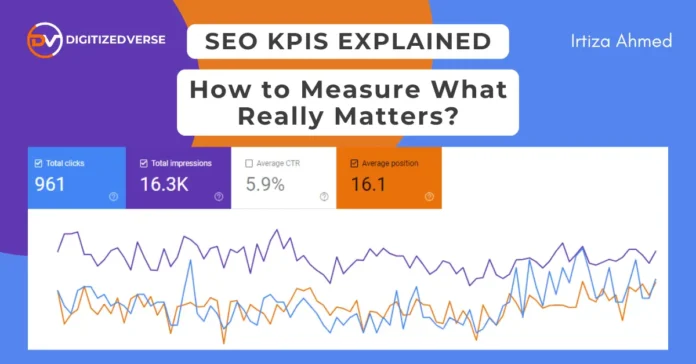In today’s competitive digital landscape, tracking and analyzing SEO KPIs (Key Performance Indicators) is crucial to measuring the success of your search engine optimization efforts. These metrics not only help you gauge the effectiveness of your strategy but also highlight areas that need improvement to reach your goals. By focusing on the right KPIs, you can boost your website’s ranking, visibility, and overall performance.
What Are SEO KPIs?
Understanding the Importance of KPIs in SEO
SEO KPIs are measurable values that indicate how effectively your website is achieving its SEO objectives. These metrics provide a clear picture of how your optimization strategies are working and which areas require attention. From organic traffic to keyword rankings and backlinks, SEO KPIs help you track progress and ensure you’re on the right path.
How SEO KPIs Impact Business Goals
SEO KPIs are not just technical numbers; they align directly with your broader business goals. By improving SEO performance, you can increase organic traffic, generate leads, and ultimately grow revenue. For instance, a higher ranking for target keywords can drive more visitors to your site, while a stronger domain authority (DA) signals your site’s credibility to search engines.
Essential SEO KPIs You Should Track
Organic Traffic as a Core Metric
Organic traffic refers to visitors who land on your website from unpaid search results. This is a fundamental KPI in SEO, as it reflects how well your content is optimized for search engines. A steady increase in organic traffic indicates that your SEO efforts are paying off and that your site is becoming more visible.
Keyword Rankings: Measuring Visibility
Tracking keyword rankings is essential to understanding your website’s position in search engine results pages (SERPs). Regularly monitoring where your site ranks for specific keywords helps you adjust your strategy to improve visibility. Use tools like SEMrush or Ahrefs to track rankings over time and measure progress.
Backlinks: Monitoring Authority and Trust
Backlinks, or links from other websites to your own, play a significant role in SEO. They signal to search engines that your content is valuable and trustworthy. High-quality backlinks from authoritative sites improve your domain authority and can significantly boost your rankings.
Domain Authority: A Vital Indicator
Domain Authority (DA) is a score that predicts how well your website will rank on search engines. Developed by Moz, DA is calculated based on various factors, including the number of backlinks, the quality of those links, and your site’s overall SEO health. Monitoring changes in your DA is an effective way to measure your site’s authority over time.
User Experience KPIs in SEO
Bounce Rate: Tracking Engagement
Bounce rate measures the percentage of visitors who leave your website after viewing only one page. A high bounce rate often indicates that users didn’t find what they were looking for or that your site has usability issues. Improving page load speed, optimizing content, and enhancing website navigation can help reduce bounce rate and improve engagement.
Pages per Session: How Visitors Navigate
This KPI tracks the number of pages a visitor views during a single session on your website. A higher number of pages per session suggests that visitors are engaged and finding value in your content. Encouraging users to explore more of your site through internal linking and relevant content recommendations can improve this metric.
Average Session Duration: Measuring User Interest
Average session duration measures how long users spend on your site. Longer sessions generally indicate that visitors find your content useful and engaging. This KPI is especially important for blogs, articles, and resource-heavy websites. Creating compelling content and clear calls to action can help keep users on your site longer.
Technical SEO KPIs
Website Load Time: Affects SEO Ranking
Website load time is a crucial KPI for both user experience and SEO. Slow-loading pages can lead to high bounce rates and a poor user experience, which negatively impacts your rankings. Tools like Google PageSpeed Insights can help you monitor and improve your site’s load time to enhance both user satisfaction and SEO performance.
Mobile Friendliness: Essential for SEO Success
With more than half of all web traffic coming from mobile devices, having a mobile-friendly website is vital. Google’s mobile-first indexing means that the mobile version of your site is prioritized for indexing and ranking. Make sure your site is responsive, fast, and user-friendly on all devices to boost your SEO performance.
Crawl Errors and Indexability Issues
Crawl errors occur when search engines fail to access certain pages on your site. These errors can prevent important content from being indexed and appearing in search results. Regularly checking for and resolving crawl errors using Google Search Console helps ensure that all of your important pages are accessible to search engines.
How to Track SEO KPIs with Google Analytics
Tracking Website Traffic in Google Analytics
Google Analytics is an invaluable tool for tracking website traffic. It provides detailed insights into your site’s visitors, their behavior, and the sources of your traffic. You can use this data to analyze how organic traffic is performing and identify trends over time.
Analyzing Organic Traffic Sources
Understanding where your organic traffic is coming from helps you focus on the most effective channels. Whether visitors are arriving via Google, Bing, or other search engines, this KPI helps you refine your SEO strategy to target the most valuable sources of traffic.
User Behavior Flow and Its Importance
The user behavior flow in Google Analytics shows how visitors move through your website, from landing pages to exit points. Analyzing this flow helps you understand which pages are engaging users and which might need improvement. It’s a useful tool for optimizing the user journey and improving conversion rates.
Using Google Search Console for SEO KPIs
Monitoring Impressions and Click-Through Rates (CTR)
Google Search Console provides data on how often your site appears in search results (impressions) and how often users click on your site (CTR). These KPIs give insight into how well your site is performing in SERPs and whether your meta descriptions and titles are compelling enough to drive clicks.
Analyzing Your Search Queries
Search queries data shows which keywords users are searching for when they find your site. By analyzing this data, you can identify high-performing keywords and discover new opportunities for optimization.
Measuring Crawl Stats and Index Coverage
Search Console also provides information on crawl stats, which show how often Googlebot is crawling your site. Ensuring that your important pages are being indexed and free from errors is critical for maintaining strong SEO performance.
How to Analyze SEO KPIs for Client Reports
Presenting Data with Clear Visuals (Screenshots of Metrics)
When reporting SEO KPIs to clients, presenting data in a visually appealing way is key. Screenshots from tools like Google Analytics and Search Console can help illustrate performance trends clearly. Make use of graphs, charts, and visuals to help clients easily understand the data.
How to Include DA, Backlinks, and Blog Metrics
For comprehensive SEO reports, include metrics such as Domain Authority (DA), backlinks, and the performance of blog content. Show clients how these factors contribute to overall SEO success and highlight areas of improvement. Tools like Moz and SEMrush can provide detailed data on these metrics.
Advanced SEO KPIs
Measuring Conversions from Organic Traffic
While traffic and rankings are important, ultimately, conversions are what matter most. Tracking how many conversions (leads, sales, etc.) are generated from organic traffic is a key KPI for measuring the true value of your SEO efforts.
Cost per Acquisition (CPA) in SEO
CPA is the cost of acquiring a customer through organic search. While SEO is generally considered a “free” traffic source, there are costs associated with content creation, link building, and technical improvements. Tracking CPA helps you measure the efficiency of your SEO investment.
ROI of SEO Efforts
Calculating the return on investment (ROI) for your SEO efforts is essential for understanding the financial impact of your strategy. Compare the revenue generated from organic traffic with the costs associated with SEO to determine the ROI.
Best Tools for Tracking SEO KPIs
SEMrush, Ahrefs, and Moz for Comprehensive SEO Data
SEMrush, Ahrefs, and Moz are three of the most popular tools for tracking SEO KPIs. They offer comprehensive data on keyword rankings, backlinks, and overall website health. These tools are invaluable for monitoring your SEO performance and staying ahead of the competition.
Using Google Data Studio for Custom SEO Dashboards
Google Data Studio allows you to create custom SEO dashboards that integrate data from various sources, including Google Analytics, Search Console, and third-party tools. This makes it easier to track, visualize, and report your SEO KPIs in one place.
Common Mistakes in Tracking SEO KPIs
Focusing Only on Vanity Metrics
Vanity metrics, such as the number of page views or social media likes, may look good on paper but don’t necessarily contribute to your business goals. Focus on actionable SEO KPIs like organic traffic, conversions, and rankings to measure true success.
Ignoring Long-Term Trends in SEO Data
SEO is a long-term game, and short-term fluctuations in metrics can be misleading. It’s important to analyze SEO data over extended periods to get a clearer picture of your site’s performance and to identify trends that can inform your strategy.
Conclusion: Why SEO KPIs Matter for Sustainable Growth
Tracking SEO KPIs is essential for ensuring sustainable, long-term growth in organic search. By focusing on the right metrics, you can make data-driven decisions that enhance your website’s performance, improve user experience, and ultimately drive more traffic and conversions. With the right tools and a clear understanding of these KPIs, you can measure what really matters and achieve lasting SEO success.
If you want the best SEO services tailored to your business, feel free to reach out—I’d be happy to help you achieve your SEO goals.




